-
 Bitcoin
Bitcoin $107,323.9971
-0.42% -
 Ethereum
Ethereum $2,442.7415
-1.58% -
 Tether USDt
Tether USDt $1.0005
0.00% -
 XRP
XRP $2.0902
-4.49% -
 BNB
BNB $645.3561
-0.33% -
 Solana
Solana $140.8832
-2.81% -
 USDC
USDC $0.9999
0.01% -
 TRON
TRON $0.2713
0.17% -
 Dogecoin
Dogecoin $0.1611
-2.35% -
 Cardano
Cardano $0.5556
-2.75% -
 Hyperliquid
Hyperliquid $36.8045
-1.10% -
 Bitcoin Cash
Bitcoin Cash $494.4393
-1.23% -
 Sui
Sui $2.6406
-2.97% -
 Chainlink
Chainlink $13.0846
-1.74% -
 UNUS SED LEO
UNUS SED LEO $9.0127
0.09% -
 Avalanche
Avalanche $17.4023
-1.37% -
 Stellar
Stellar $0.2339
-3.25% -
 Toncoin
Toncoin $2.8330
-0.57% -
 Shiba Inu
Shiba Inu $0.0...01124
-3.38% -
 Litecoin
Litecoin $84.9229
-0.60% -
 Hedera
Hedera $0.1432
-3.84% -
 Monero
Monero $311.0740
-1.35% -
 Bitget Token
Bitget Token $4.6591
3.94% -
 Dai
Dai $1.0001
0.01% -
 Ethena USDe
Ethena USDe $1.0000
-0.01% -
 Polkadot
Polkadot $3.3033
-1.64% -
 Uniswap
Uniswap $6.9221
-4.55% -
 Pi
Pi $0.5546
-4.86% -
 Aave
Aave $257.5046
-1.30% -
 Pepe
Pepe $0.0...09215
-3.26%
Basic routines of Bitcoin contracts
The evaluation of inputs and external data sources enables Bitcoin contracts to execute only when specific conditions are fulfilled, ensuring their reliability and adherence to the agreed-upon terms.
Nov 26, 2024 at 08:20 pm

Basic Routines of Bitcoin Contracts
Bitcoin contracts, also known as smart contracts, are self-executing contracts deployed on the Bitcoin blockchain. They enable the creation of trustless and transparent agreements between parties without the need for intermediaries. Understanding the basic routines involved in designing and deploying Bitcoin contracts is crucial for leveraging their capabilities effectively.
1. Defining Contract Parameters
The first step involves defining the contract's parameters, including the terms of the agreement, obligations of the parties, and any specific conditions that must be met. These parameters are encoded within the contract's code, following specific syntax and rules to ensure unambiguous interpretation by the network.
2. Setting Contract Conditions
Conditions are specific requirements or events that must be fulfilled before the contract can be executed. They are typically defined as rules that evaluate inputs or external data sources, such as oracle services or other blockchain events. Conditions play a critical role in ensuring the contract's functionality and execution only when all predefined conditions are satisfied.
3. Handling Contract States
Bitcoin contracts can transition between different states based on the conditions they evaluate and the actions they perform. Typically, a contract starts in an "inactive" state and transitions to an "active" state once the conditions are met. The contract's code defines the state transitions and how they affect the execution of its actions.
4. Executing Contract Actions
Once the contract's conditions are met, it enters the execution phase. During this phase, the contract's code executes the specified actions, which can include sending or receiving Bitcoin, updating contract state, triggering events, or interacting with other blockchain elements. The execution process ensures the automated performance of contract actions as defined by its terms.
5. Monitoring Contract Events
Bitcoin contracts can emit events that notify the network and external parties about specific occurrences within the contract. These events can be triggered by state transitions, execution actions, or specific conditions. Monitoring contract events allows external applications and blockchain participants to react to significant events and respond accordingly.
6. Interacting with External Data
Bitcoin contracts can interact with external data sources, such as oracle services, to obtain information necessary for evaluating conditions or executing actions. Oracles provide a bridge between the blockchain and the real world, enabling contracts to access data and events from external systems and utilize them within their logic.
7. Managing Contract Security
Securing Bitcoin contracts is paramount to ensure their integrity, reliability, and resistance to malicious attacks. Security measures include verifying the validity of transactions, implementing access controls, handling exceptions and errors, and employing cryptographic techniques to protect sensitive data and secure communication.
8. Testing and Deploying Contracts
Before deploying Bitcoin contracts on the blockchain, thorough testing is essential to identify and mitigate potential issues. Testing involves simulating contract execution, analyzing code behavior, and ensuring that the contract functions as intended under various scenarios. Once testing is complete, the contract can be deployed on the blockchain, making it accessible and executable by the network participants.
Disclaimer:info@kdj.com
The information provided is not trading advice. kdj.com does not assume any responsibility for any investments made based on the information provided in this article. Cryptocurrencies are highly volatile and it is highly recommended that you invest with caution after thorough research!
If you believe that the content used on this website infringes your copyright, please contact us immediately (info@kdj.com) and we will delete it promptly.
- Queenstown Tech Super-charging: A Glimpse into the Future
- 2025-06-28 00:30:12
- Dogecoin, Ethereum, Solana: Decoding the Crypto Climate in the Big Apple
- 2025-06-28 00:47:15
- Sonic Speed Meets Mana Might: A Magic: The Gathering Crossover!
- 2025-06-28 00:37:13
- Bitcoin Price Puzzle: Institutional Buying vs. Market Discrepancy Explained
- 2025-06-27 22:30:12
- Neo Pepe Coin ($NEOP): Certik Audit Success & Crypto Presales Heats Up
- 2025-06-27 22:30:12
- Bitcoin Price Prediction: Mixed Signals as BTC Eyes $110K
- 2025-06-27 22:50:11
Related knowledge
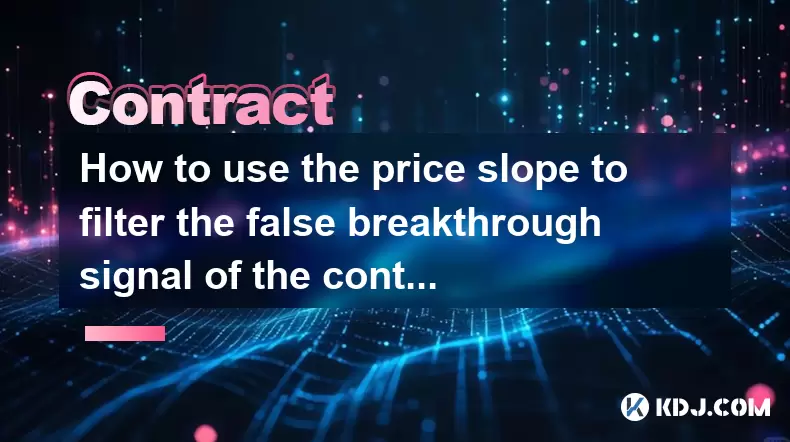
How to use the price slope to filter the false breakthrough signal of the contract?
Jun 20,2025 at 06:56pm
Understanding the Concept of Price Slope in Contract TradingIn contract trading, especially within cryptocurrency derivatives markets, price slope refers to the rate at which the price changes over a specific time period. It helps traders assess the strength and sustainability of a trend. A steep slope may indicate strong momentum, while a shallow slope...
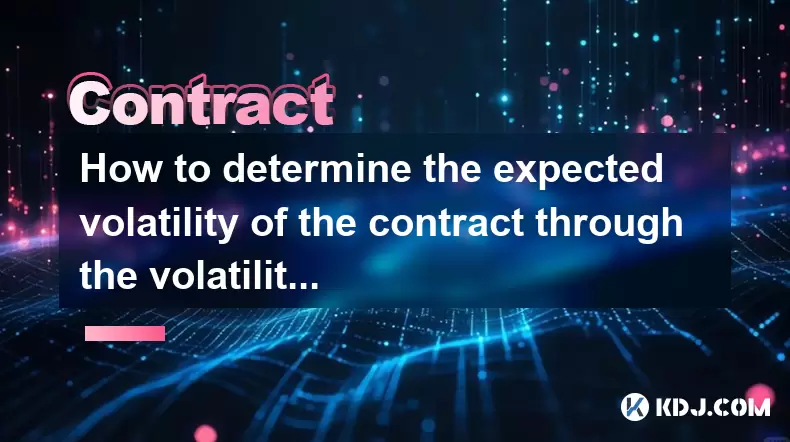
How to determine the expected volatility of the contract through the volatility cone?
Jun 19,2025 at 12:28pm
Understanding the Basics of Volatility in Cryptocurrency ContractsIn the realm of cryptocurrency trading, volatility is a key metric that traders use to assess potential risk and reward. When dealing with futures contracts, understanding how volatile an asset might become over time is crucial for position sizing, risk management, and strategy developmen...
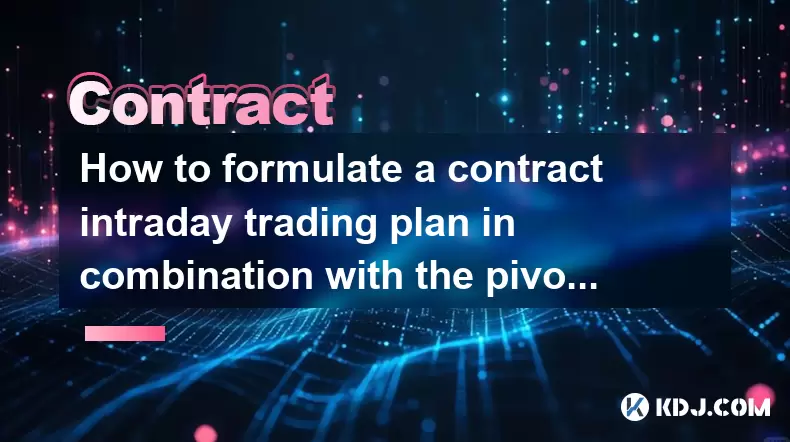
How to formulate a contract intraday trading plan in combination with the pivot point system?
Jun 21,2025 at 03:42pm
Understanding the Basics of Pivot Points in Cryptocurrency TradingPivot points are technical analysis tools used by traders to identify potential support and resistance levels. These levels are calculated using the previous day's high, low, and closing prices. In the context of cryptocurrency trading, where markets operate 24/7, pivot points help trader...
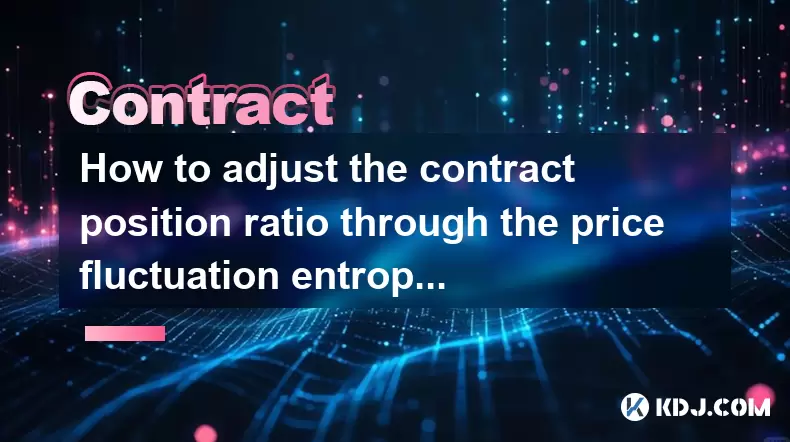
How to adjust the contract position ratio through the price fluctuation entropy?
Jun 22,2025 at 11:42am
Understanding Price Fluctuation Entropy in Cryptocurrency ContractsIn the world of cryptocurrency futures trading, price fluctuation entropy is a relatively new concept used to measure market volatility and uncertainty. It derives from information theory, where entropy refers to the degree of randomness or unpredictability in a system. In crypto contrac...
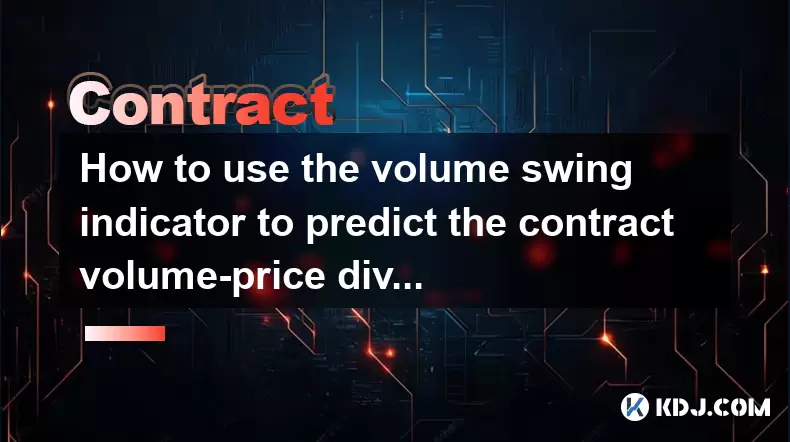
How to use the volume swing indicator to predict the contract volume-price divergence?
Jun 18,2025 at 11:42pm
Understanding the Volume Swing IndicatorThe volume swing indicator is a technical analysis tool used primarily in cryptocurrency trading to evaluate changes in volume over time. Unlike price-based indicators, this metric focuses solely on trading volume, which can provide early signals about potential market reversals or continuations. The key idea behi...

How to use the Gaussian channel to set the contract trend tracking stop loss?
Jun 18,2025 at 09:21pm
Understanding the Gaussian Channel in Cryptocurrency TradingThe Gaussian channel is a technical indicator used primarily in financial markets, including cryptocurrency trading, to identify trends and potential reversal points. It is based on statistical principles derived from the normal distribution, commonly known as the Gaussian distribution or bell ...

How to use the price slope to filter the false breakthrough signal of the contract?
Jun 20,2025 at 06:56pm
Understanding the Concept of Price Slope in Contract TradingIn contract trading, especially within cryptocurrency derivatives markets, price slope refers to the rate at which the price changes over a specific time period. It helps traders assess the strength and sustainability of a trend. A steep slope may indicate strong momentum, while a shallow slope...

How to determine the expected volatility of the contract through the volatility cone?
Jun 19,2025 at 12:28pm
Understanding the Basics of Volatility in Cryptocurrency ContractsIn the realm of cryptocurrency trading, volatility is a key metric that traders use to assess potential risk and reward. When dealing with futures contracts, understanding how volatile an asset might become over time is crucial for position sizing, risk management, and strategy developmen...

How to formulate a contract intraday trading plan in combination with the pivot point system?
Jun 21,2025 at 03:42pm
Understanding the Basics of Pivot Points in Cryptocurrency TradingPivot points are technical analysis tools used by traders to identify potential support and resistance levels. These levels are calculated using the previous day's high, low, and closing prices. In the context of cryptocurrency trading, where markets operate 24/7, pivot points help trader...

How to adjust the contract position ratio through the price fluctuation entropy?
Jun 22,2025 at 11:42am
Understanding Price Fluctuation Entropy in Cryptocurrency ContractsIn the world of cryptocurrency futures trading, price fluctuation entropy is a relatively new concept used to measure market volatility and uncertainty. It derives from information theory, where entropy refers to the degree of randomness or unpredictability in a system. In crypto contrac...

How to use the volume swing indicator to predict the contract volume-price divergence?
Jun 18,2025 at 11:42pm
Understanding the Volume Swing IndicatorThe volume swing indicator is a technical analysis tool used primarily in cryptocurrency trading to evaluate changes in volume over time. Unlike price-based indicators, this metric focuses solely on trading volume, which can provide early signals about potential market reversals or continuations. The key idea behi...

How to use the Gaussian channel to set the contract trend tracking stop loss?
Jun 18,2025 at 09:21pm
Understanding the Gaussian Channel in Cryptocurrency TradingThe Gaussian channel is a technical indicator used primarily in financial markets, including cryptocurrency trading, to identify trends and potential reversal points. It is based on statistical principles derived from the normal distribution, commonly known as the Gaussian distribution or bell ...
See all articles























































































